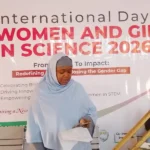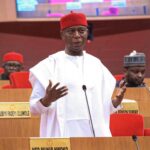By Emmanuella Anokam
Stakeholders in the energy sector have called for the effective implementation of existing gas utilisation policies to drive industrialisation and reduce poverty across Africa.
The call was made by Dr Emeka Okafor, Founder and Managing Consultant of Emogas Limited, and Chief Host of the 2nd Annual Emogas International Natural Gas-Based Industry Conference and Exhibition (EINGICE 2025), on Friday in Abuja.
Okafor said Nigeria and other African countries must move beyond lamenting underutilised gas reserves to fully harnessing them for sustainable economic growth.
“Nigeria has abundant gas resources that can make us an economically prosperous nation if properly harnessed. We already have several policies in place; what remains is full and sincere implementation,” he said.
He noted that gas-based industrialisation could tackle Nigeria’s persistent power and poverty challenges by ensuring reliable electricity supply and supporting energy-intensive industries.
“If we use gas effectively for power generation, Nigeria will be fully powered, industries will thrive, jobs will be created, and poverty will be reduced,” he said.
Okafor identified poor policy implementation, corruption, and mismanagement as key barriers to maximising the country’s gas potential.
He urged government to prioritise transparency and public awareness on the benefits of gas utilisation.
Speaking on the emerging Africa Energy Bank (AEB), he described it as a “game changer” capable of financing Africa’s energy transformation without over-reliance on external institutions.
“The Africa Energy Bank is an innovative idea that will enable African entrepreneurs to access funds for gas projects and industrial ventures using local resources,” he said.
According to him, the bank could support projects such as Liquefied Petroleum Gas (LPG) plants and gas monetisation initiatives, particularly in communities affected by gas flaring.
“Imagine the jobs that will be created when such projects are established. The Africa Energy Bank can drive industrialisation in Africa if managed transparently and free of corruption and political interference,” he added.
Earlier, the Executive Chairman/CEO of the Presidential Initiative for Compressed Natural Gas (Pi-CNG), Mr Ismaeel Ahmed, commended the organisers for providing a platform to advance conversations on Nigeria’s gas-driven industrial future.
Ahmed reaffirmed Pi-CNG’s commitment to driving the nation’s clean energy transition through the promotion of Compressed Natural Gas (CNG).
He said the initiative continues to invest in gas infrastructure expansion, deepen local usage, and foster inclusive economic growth.
He also called for stronger collaboration among policymakers, industry players, and investors, stressing that collective effort is key to unlocking opportunities within Nigeria’s gas value chain.
Delivering the keynote address, Executive Secretary of the Nigerian Content Development and Monitoring Board (NCDMB), Mr Felix Ogbe, said the conference theme highlights Africa’s pathway to a sustainable energy future through effective gas utilisation.
Ogbe, represented by the General Manager, Monitoring and Evaluation Directorate, Ms Lekoma Phimia, said the theme aligns with Nigeria’s Decade of Gas, reflecting government commitment to harness gas as a transition fuel.
He commended the organisers for fostering dialogue on policy and financial frameworks that will accelerate industrialisation, deepen investment, and strengthen collaboration among stakeholders in the natural gas sector across Africa.
He reaffirmed NCDMB’s strong support for the Africa Energy Bank (AEB), describing it as strategic to addressing funding gaps in hydrocarbon projects and boosting local content and energy security across the continent.
Ogbe cited NCDMB’s Nigerian Content Development Fund’s $300 million disbursement as proof of success, noting procurement reforms that enhance transparency, efficiency, and support Africa’s broader goal of inclusive, energy-driven industrial transformation.
Also speaking, energy expert Mr ThankGod Egbe called for deeper collaboration among energy banks, governments, industry players, and academia to address procurement challenges in Africa’s gas sector.
Egbe identified high capital costs, limited access to specialised equipment, and foreign exchange constraints as major hurdles.
He urged energy banks to develop tailored financing products and governments to provide fiscal incentives.
Similarly, Mr Ere Iyalla, Head of Gas Division at the Petroleum Technology Development Fund (PTDF), said home-grown development was crucial to ending energy poverty and achieving sustainable growth in Nigeria’s energy sector.
He noted that Nigeria’s vast gas reserves, if efficiently harnessed, could ensure reliable and affordable power supply, boost industrial production, and reduce dependence on diesel as the country transitions to cleaner energy.
Iyalla said ending energy poverty in Nigeria requires a multi-track approach; expanding off-grid access, fixing metering and losses, using gas as a transitional source, and reforming policies to attract investment.
During the panel sessions, experts including Mr Gbite Falade, Mr Tein Jack-Rich, Mr Bassey Rex, and Dr Abiodun Ogunjobi emphasised the need to end energy poverty to unlock Nigeria’s full economic potential.
They noted that targeted policy reforms, improved regulatory frameworks, and stronger incentives for private sector investment would accelerate industrialisation, enhance energy access, and drive inclusive economic growth across the country.
The two-day conference brought together energy experts, policymakers, and investors to explore strategies for harnessing Africa’s gas resources to promote industrial growth and energy security.
Highlights of the conference included awards to industry leaders for innovative energy development and exhibitions showcasing renewable technologies. (NAN)
Edited by Tosin Kolade












